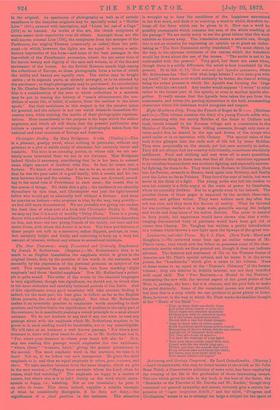The New Testament : newly Translated and Critically Emphasised. By
Joseph B. Rotherham. (Bageter.)—Mr. Rotherham's idea is to mark in an English translation the emphasis which is given in the original Greek, first, by the position of the words in the sentence, and secondly, by the expression of the personal pronoun as subject of the verb. This emphasis he marks by lines, two lines marking 'slight emphasis' and three 'decided emphasis.' Now Mr. Rotherham's princi- ple is quite sound. The order of the words in the classical languages is very significant, though lose significant, we should say, in Greek than in the more elaborate and carefully balanced periods of the Latin. And of this significance every good translator will take account, finding it indeed, for the most part, his boat plan to follow, as far as the English idiom permits, the order of the original. But when Mr. Rotherham makes it an invariable practice to emphasise words according to their position, and further limits the significance of position to the early part of the sentence, he is manifestly pushing a sound principle to a most absurd extreme. We do not hesitate to say that if any one were to read any passage aloud with the emphasis which Mr. Rotherham requires to be given to it, such reading would be intolerable, not to say unintelligible. We will take as an instance a well known passage, " For where your treasure is, there will your heart ho also ;" or, as Mr. Rotherham has it, "For, where your treasure is—there your heart will also be." Now, any one reading this passage would emphasise the two antitheses, where, there," "treasure, heart," giving tho greater prominence to the second. The most emphatic word in the sentence, we take it, is heart. Not so, if we follow our new interpreter. Ile gives the chief emphasis to is, and then an equal emphasis to where, your, treasure, and there. We take another instance from the same chapter, which we give in the new version,—" Happy those servants whom the Lord, when he comes, shall find watching!" The emphasis on happy is a matter of course, but where else is it to fall ? Surely on the word which corre- sponds to happy, i.e., watching. Not so our translator ; he puts it on when he comes. This verse, indeed, supplies a notable example of what he consistently disregards, if he does not deny,—the significance of a final position in the sentence. The attention is wrought up to hear the conditions of the happiness announced in the first word, and finds it in watching, a word to which therefore be- longs all the force which can be given to it. How can a word be possibly unemphatic which contains the sum of the whole teaching of the passage ? We are really sorry to see the great labour that this work exhibits so thrown away. The translation seems a careful one, though this is not an occasion for expressing an opinion on so great an under- taking as "The New Testament newly translated." We must object, by the way, to the extreme strictness of the canons which the translator would lay down about the use of the tenses. "The aoriet is not to be confounded with the present." Very good, but there are cases when, though there is a subtle difference, the aoriat is best translated by the present. So in Gal. vi. 11, °the: ztarycors 44710 typuAku. yptif.q.canr, where Mr. Rotherham has "See! with what large letters I wrote unto you with my hand,' but where write would certainly be better, the time of writing being the actual present in which the Apostle was forming the 'large letters' with his own hand. Any reader would suppose "I wrote" to refer rather to the former part of the epistle, or even to another epistle alto- gether. It really means that the Apostle here takes the pen from the amanuensis, and writes his parting injunctions in the bold, commanding characters which his Galatians would recognise and respect.


































 Previous page
Previous page